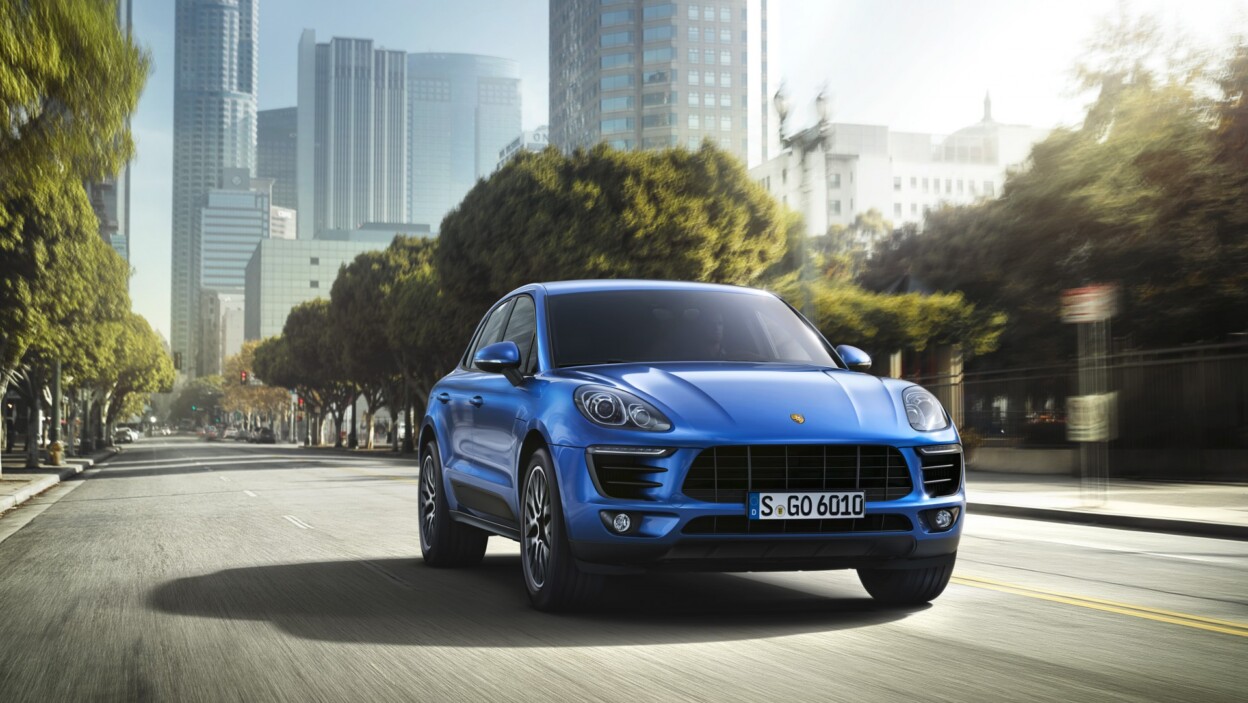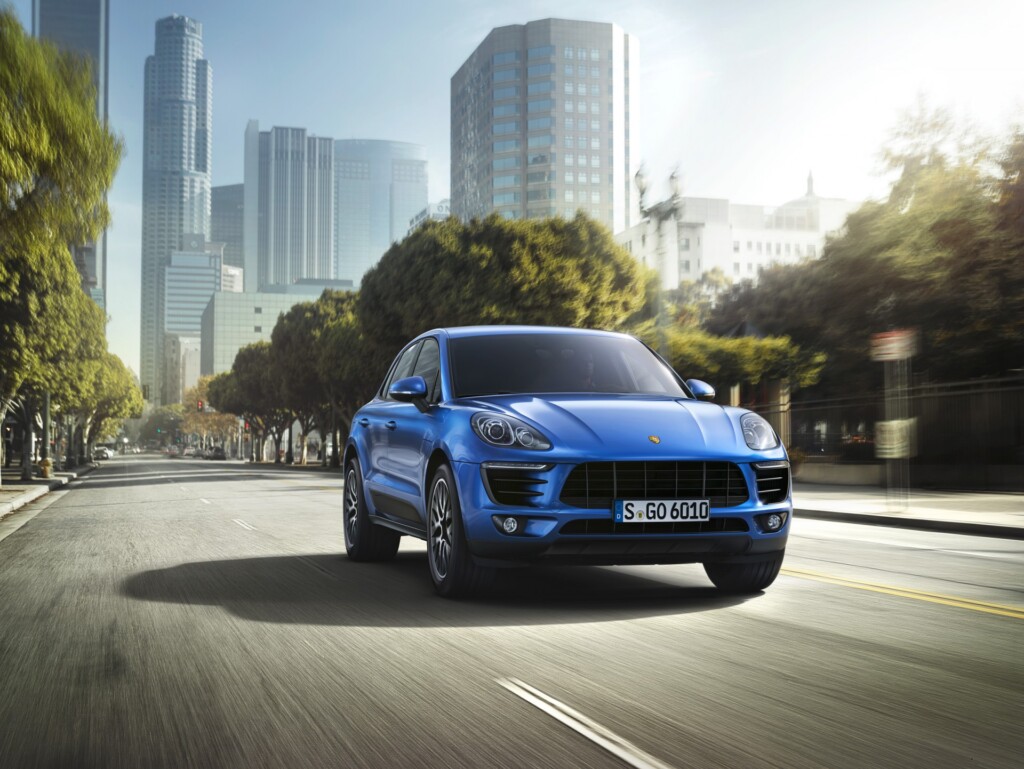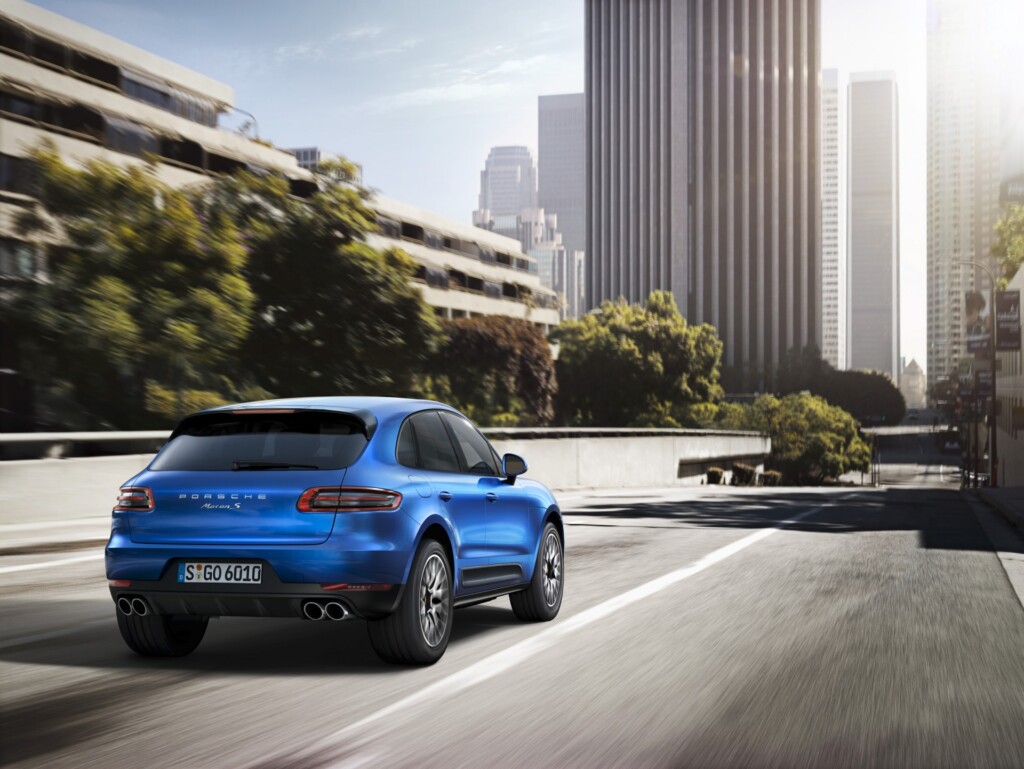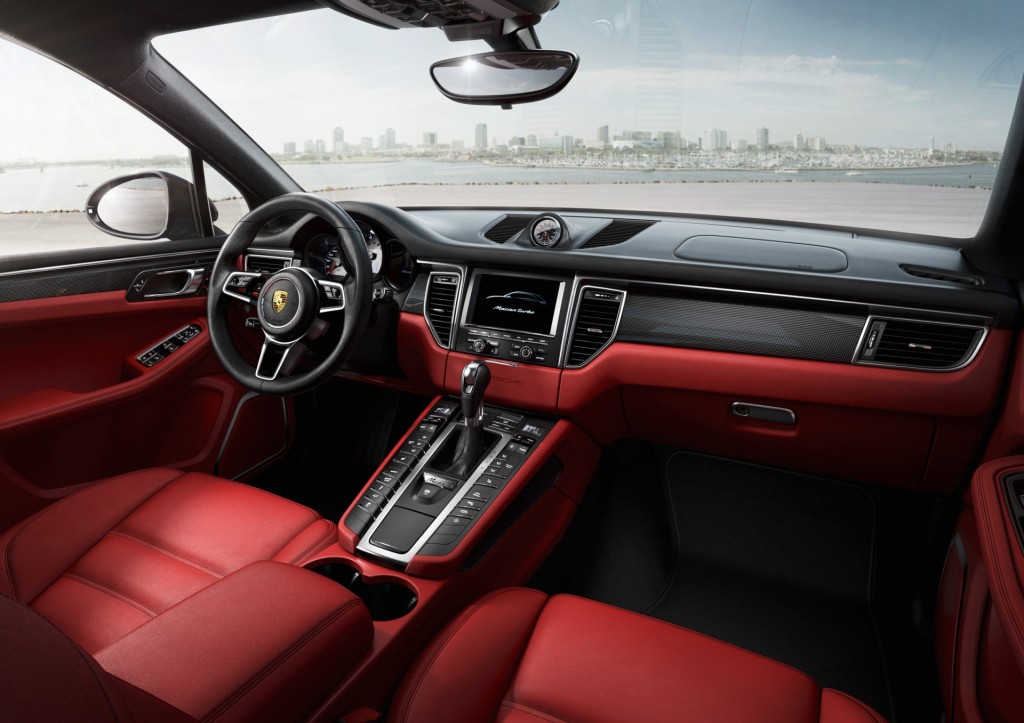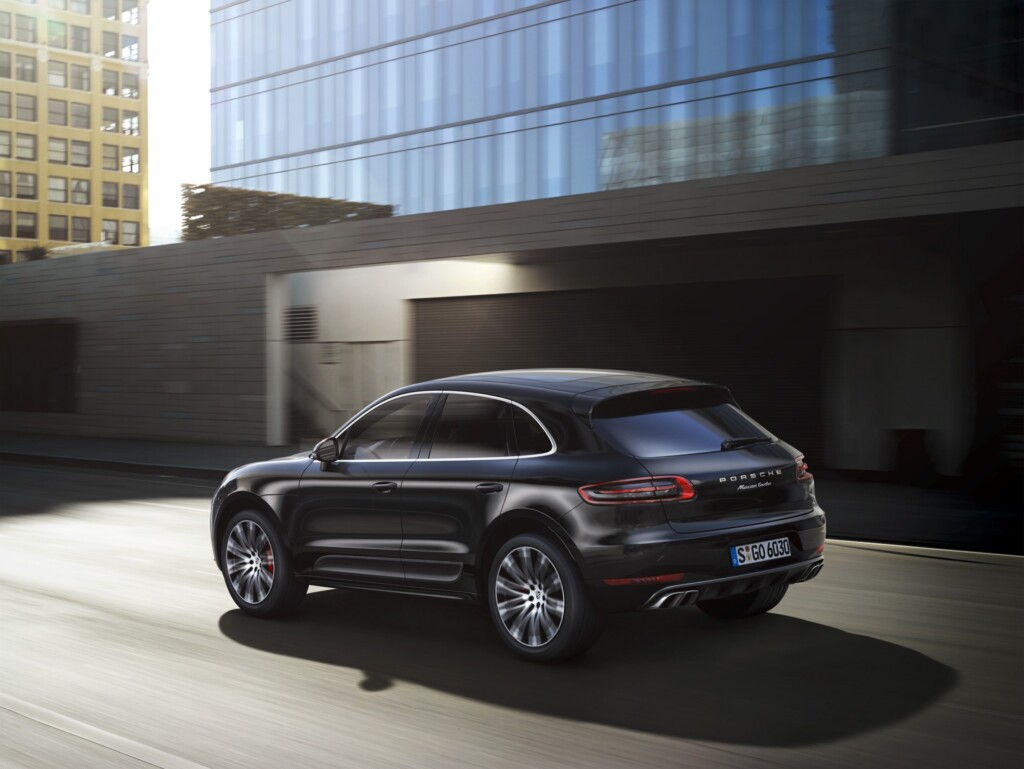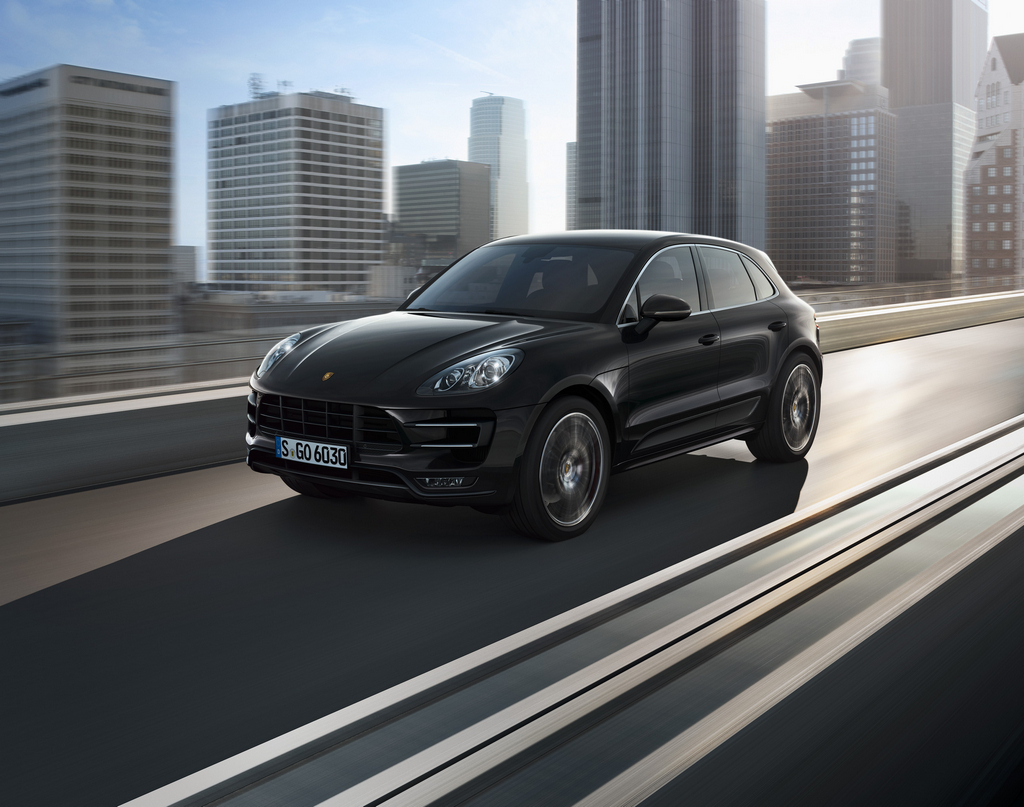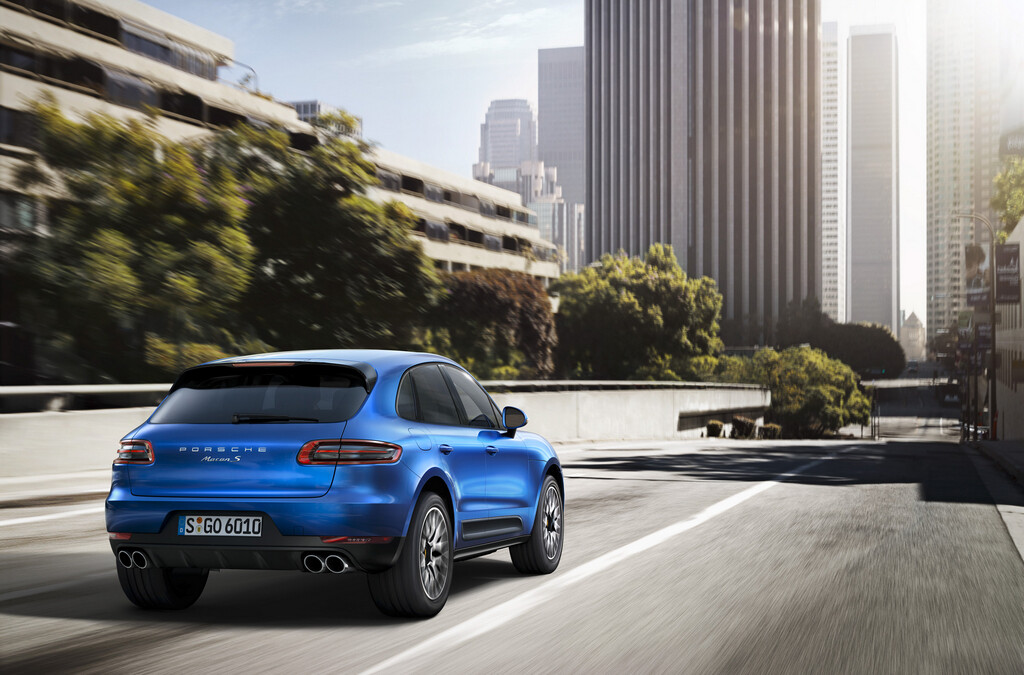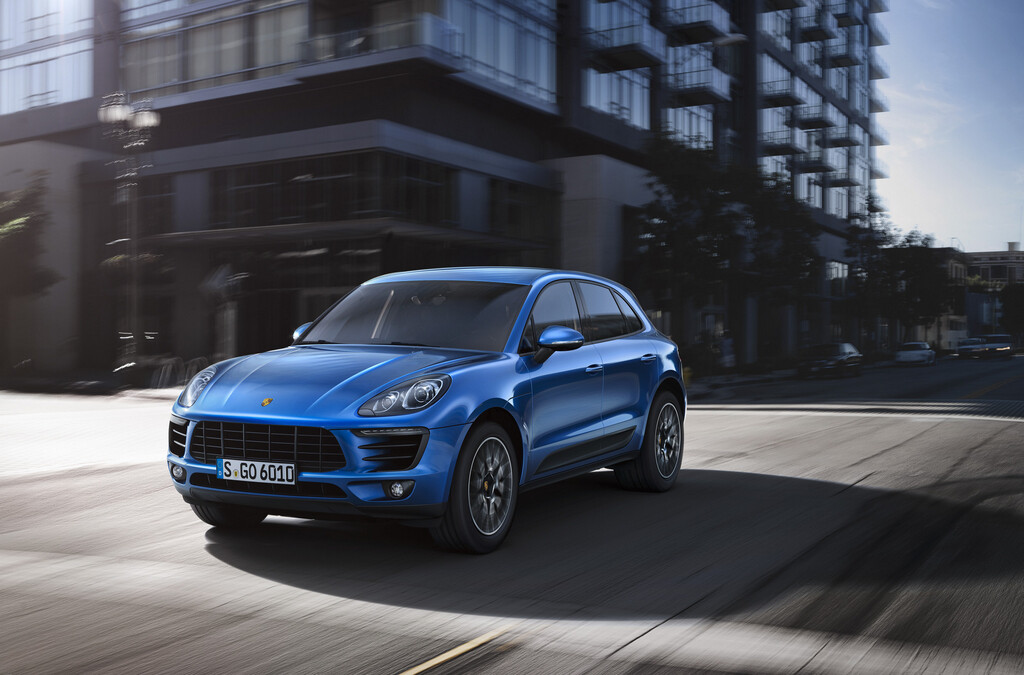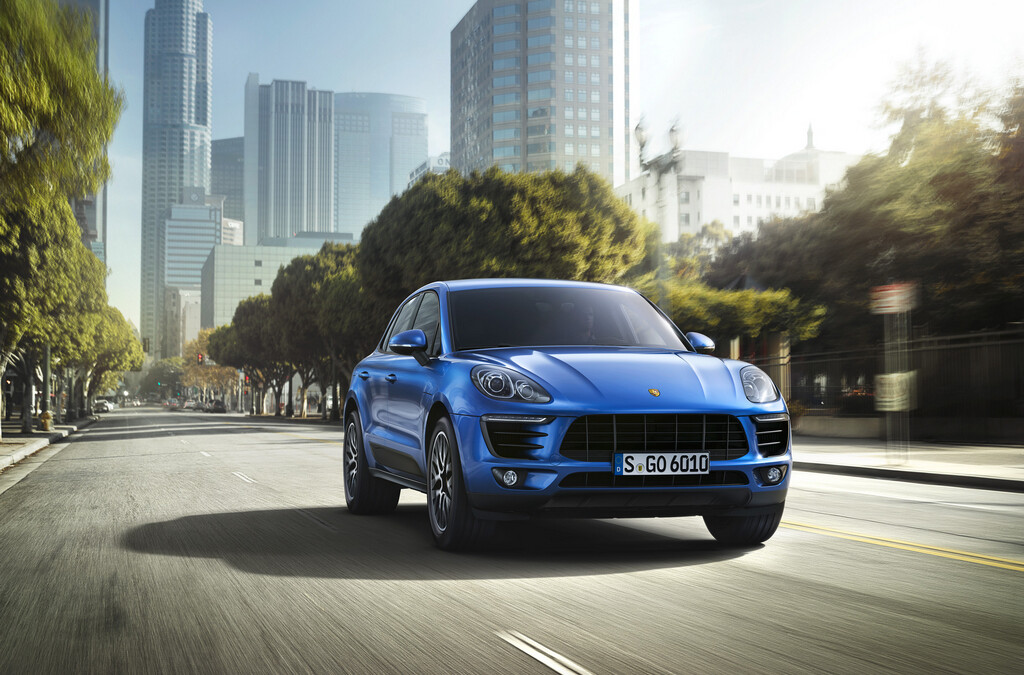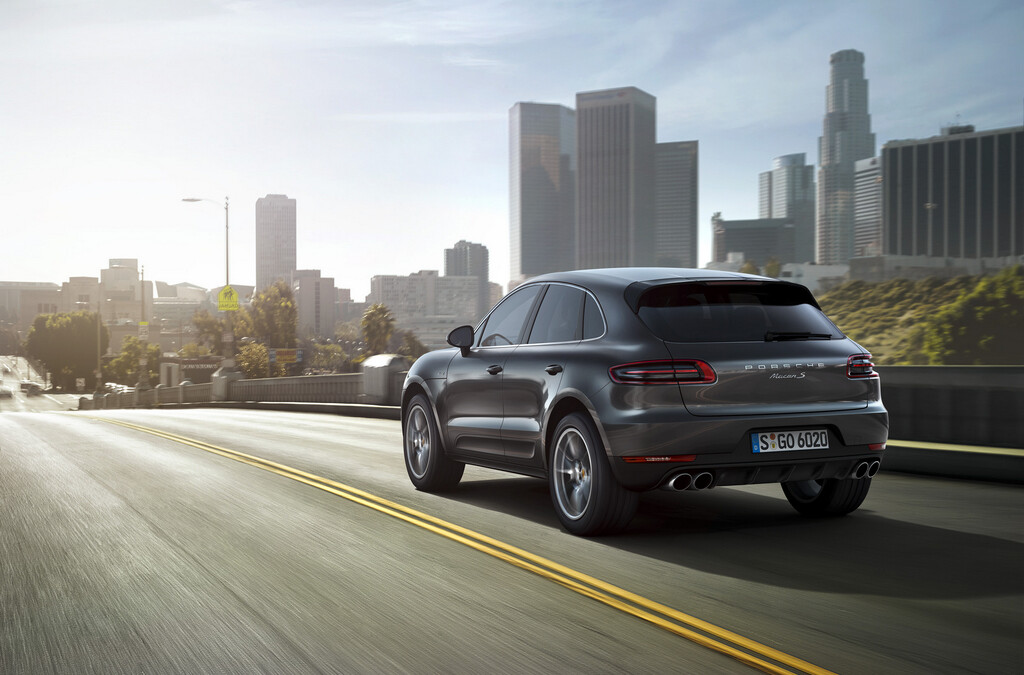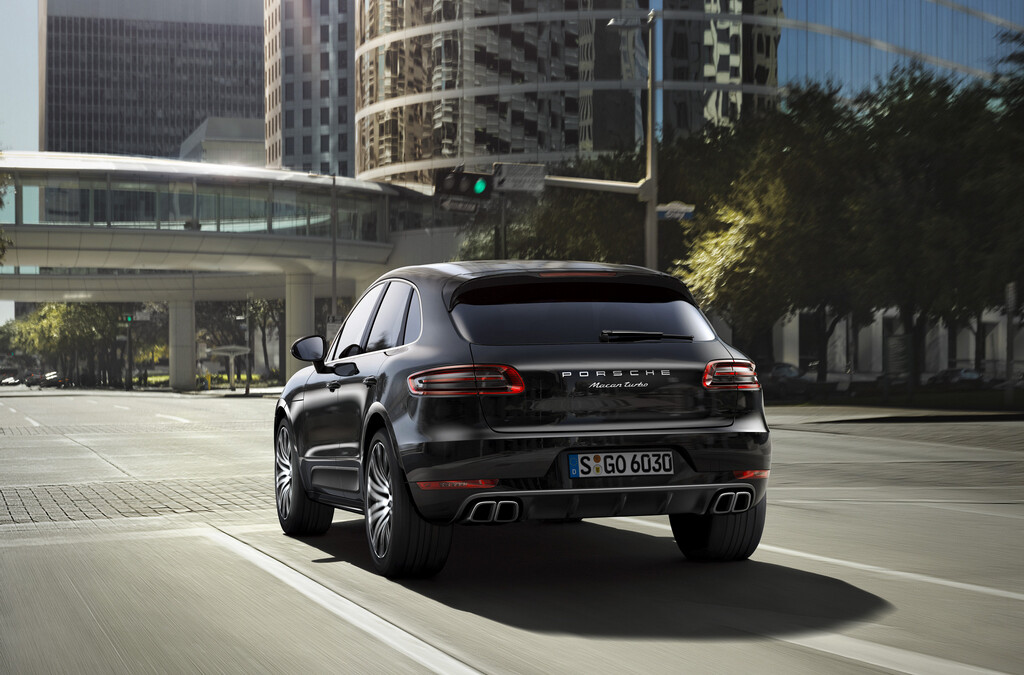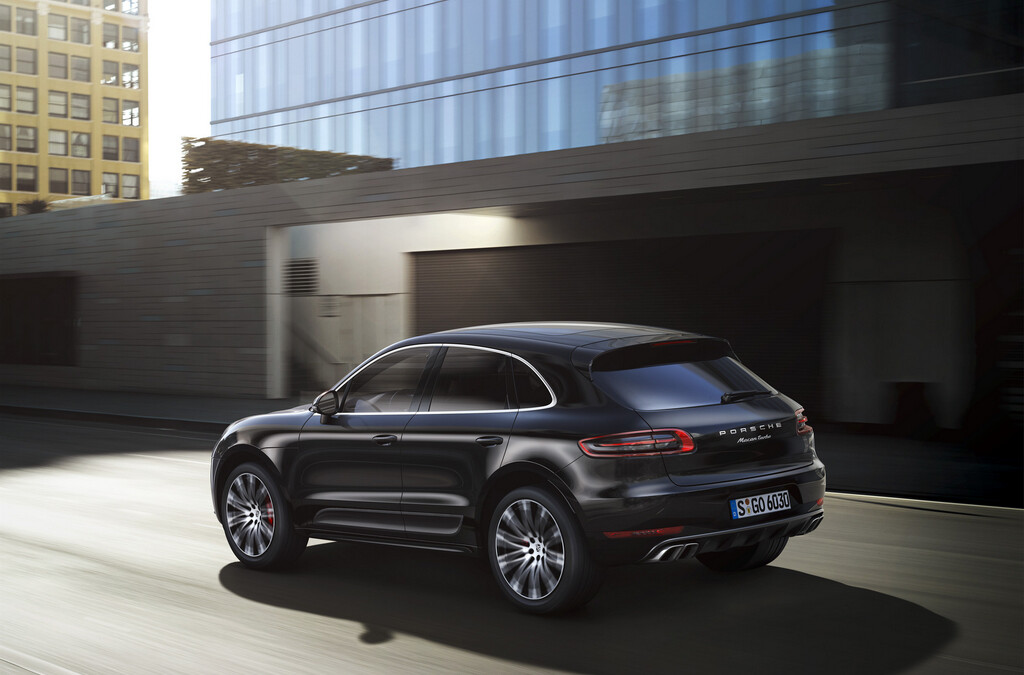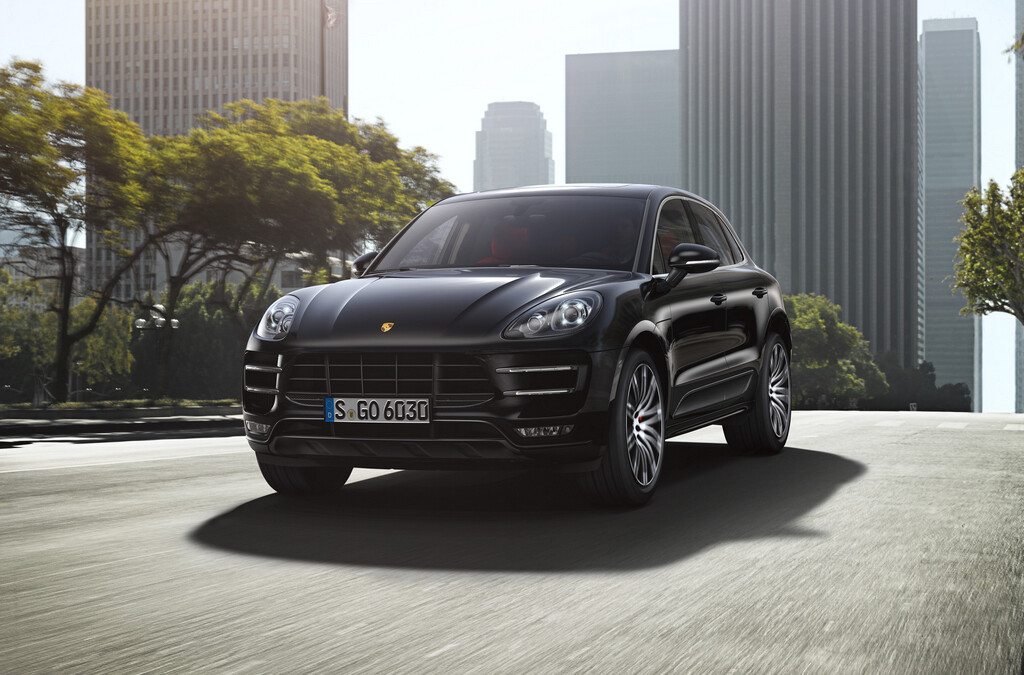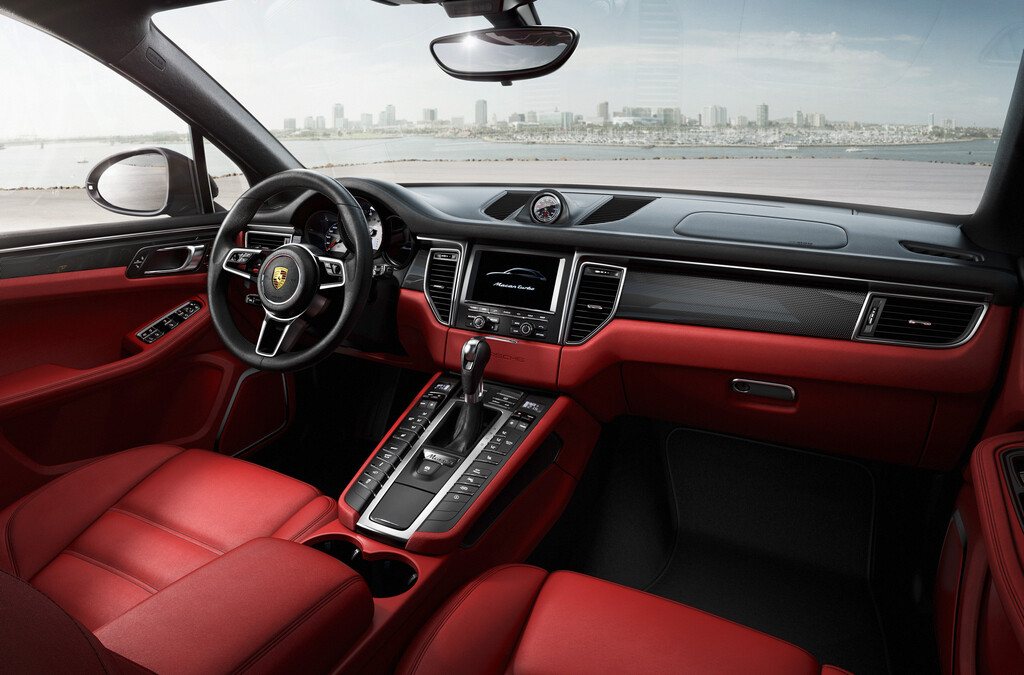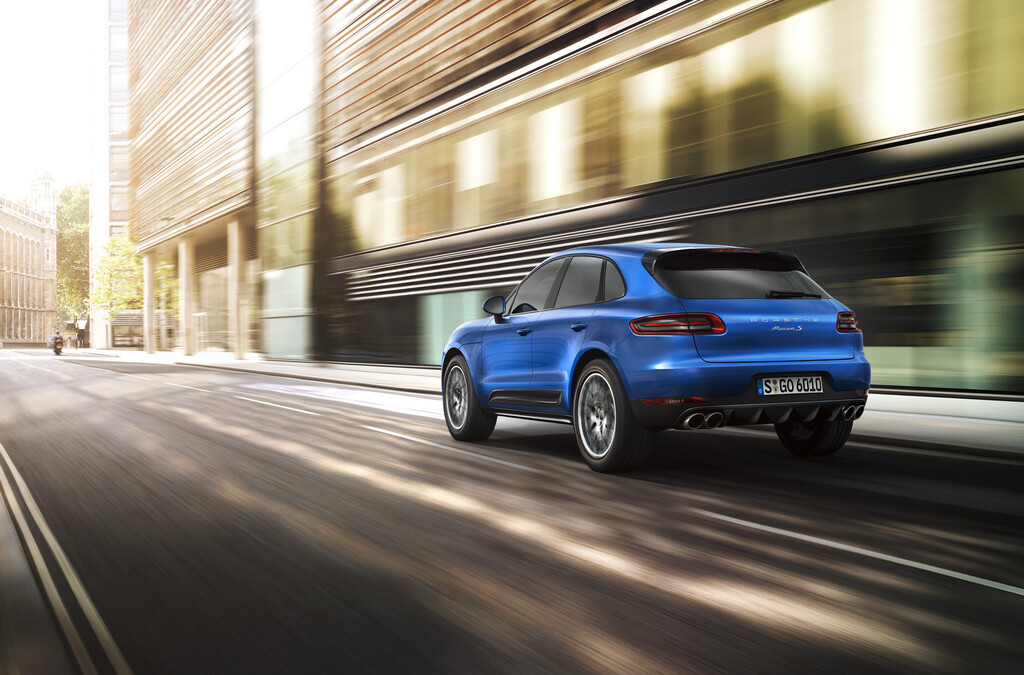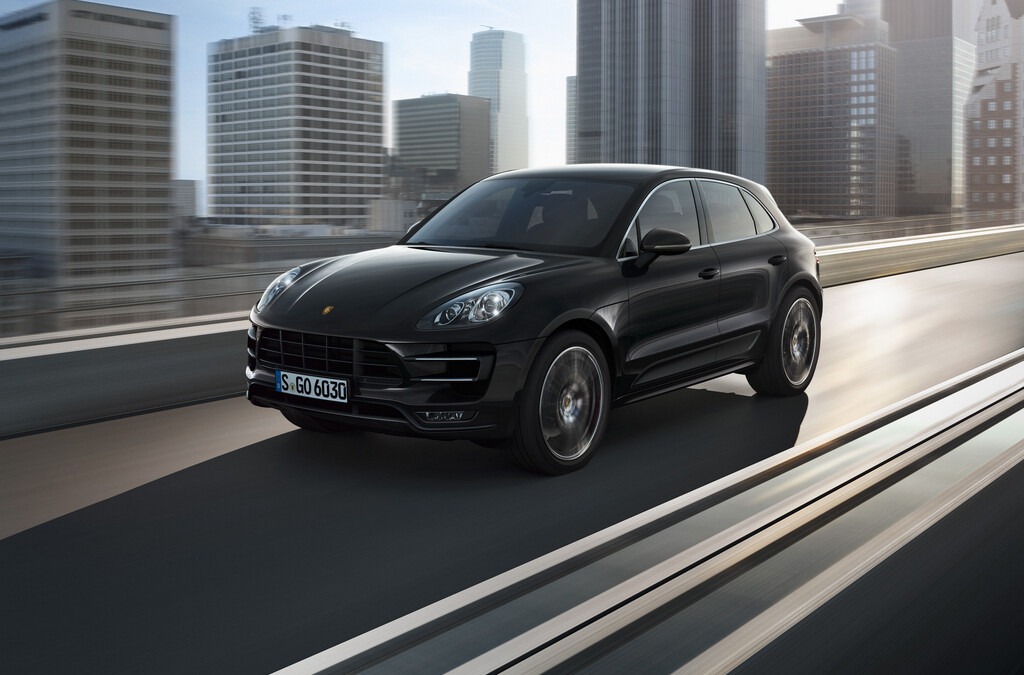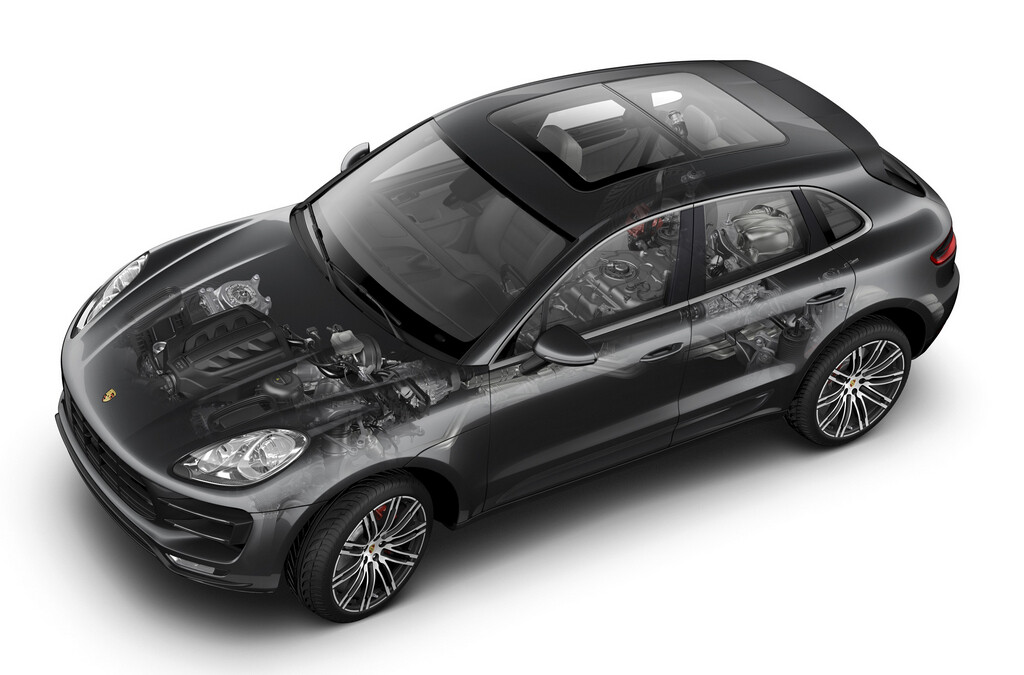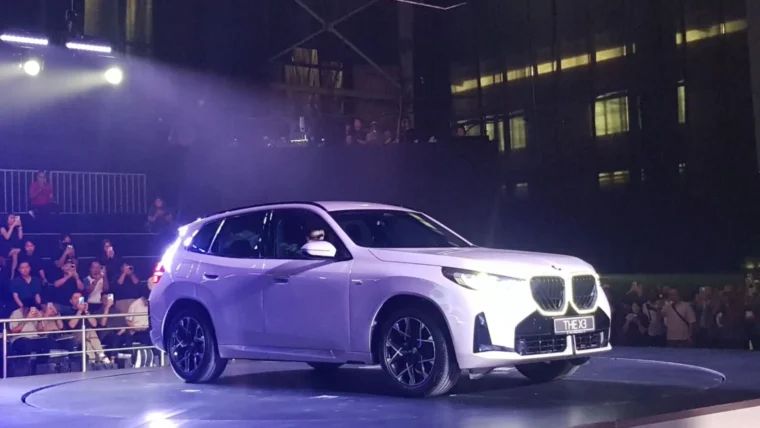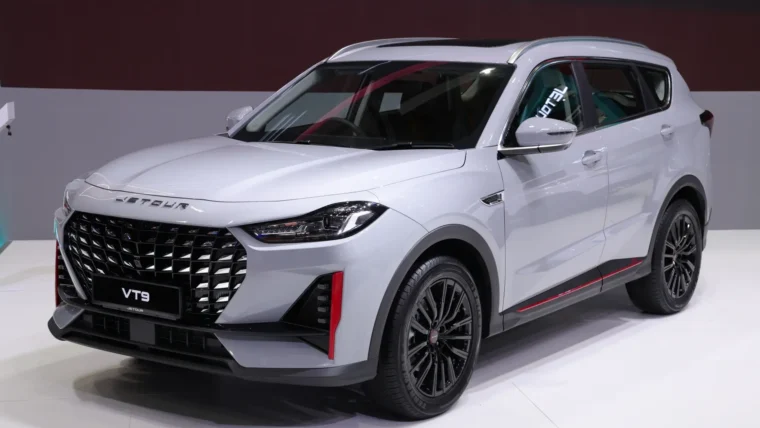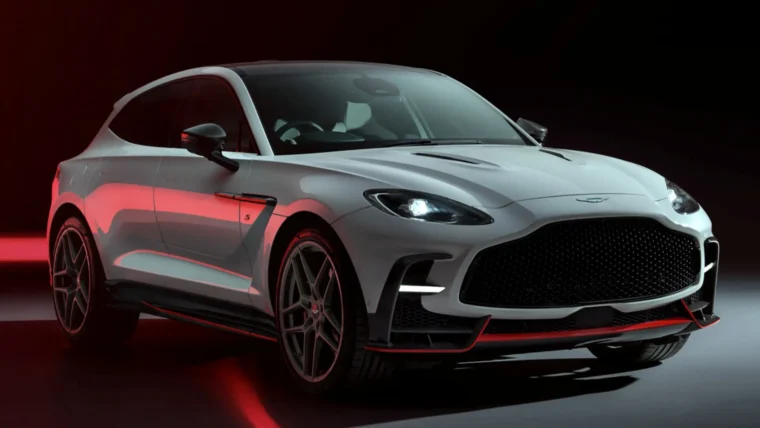Porsche is expanding its range to include a whole new class of vehicle. The Macan is the first Porsche model to break into the compact SUV segment and is poised to set new standards in the field of driving dynamics and enjoyment – on both paved streets uneven terrain.
The Macan combines the typical handling characteristics that Porsche has represented right from the outset: maximum acceleration and braking values, vast engine power, extreme agility and optimum steering precision. What’s more, all of these features are teamed with a high level of comfort and everyday suitability. The sporty DNA of the Macan, as with all Porsche vehicles, is also immediately recognisable in the design. The Sports Utility Vehicle is unrivalled in its flat and broad profile on the road. The wraparound bonnet and gently sloping roof line accentuate the overall impression of sporty elegance and powerful dynamics. Many of the design elements have been taken from other Porsche sportscars and enhanced for the Macan, making it clear to see from the very first glance that the Porsche Macan heralds the first sportscar in the compact SUV segment. The Macan is “Made in Germany”, produced at the Leipzig plant. Porsche has invested 500 million euro in the plant and has established an entire production line there. The line is set up to produce around 50,000 vehicles per year – all manufactured with the utmost precision and to the highest level of quality. Just what you would expect from Porsche.
Three models comprise the Macan product range at market launch. The (1)Macan S is equipped with a 3.0-litre V6 biturbo engine delivering 340 bhp (250 kW) and also features an active all-wheel drive with an electronically controlled, map-controlled multi-plate clutch. This all-wheel drive is fitted on all Macan models. A seven-speed double-clutch transmission transfers power as required and almost without any interruption in tractive force, enabling the vehicle to accelerate from 0 to 100 km/h in 5.4 seconds (or 5.2 seconds with the optional Sport Chrono package fitted). The vehicle reaches a top speed of 254 km/h, and its NEDC* fuel consumption figures are between 9.0 and 8.7 litres/100 km, which corresponds to a CO2 emissions level of between 212 and 204 g/km.
The (2)Macan S Diesel is the economical long-distance runner of the three Macan models. Its 3.0-litre V6 turbo diesel engine achieves NEDC* fuel consumption figures of between just 6.3 and 6.1 litres/100 km, which corresponds to a CO2 value of between 164 and 159 g/km. Nevertheless, the Macan S Diesel accelerates from 0 to 100 km in just 6.3 seconds (or 6.1 seconds with the Sport Chrono package fitted) thanks to its 258-bhp (190-kW) engine, and achieves a top speed of 230 km/h.
As the top model in the Macan model line, the (3)Macan Turbo is set to be the most powerful vehicle in the compact SUV segment. The 3.6-litre V6 biturbo engine, which is being used in a Porsche model for the very first time, achieves an unrivalled 400 bhp (294 kW) and catapults the vehicle from 0 to 100 km/h in 4.8 seconds. With the Sport Chrono package fitted, it is even possible to achieve such a speed in 4.6 seconds. Although the top speed is 266 km/h, the Macan Turbo delivers NEDC* fuel consumption figures of between just 9.2 and 8.9 litres/100 km, which equates to a CO2 value of between 216 and 208 g/km.
Its name comes from the Indonesian word for tiger. And the Macan really does live up to its name: powerful and ready to pounce at any time, yet light-footed and tenacious on off-road terrain. The latest stage of evolution of the all-wheel drive – known as Porsche Traction Management (PTM) – has produced one of the world’s most powerful drive systems. In launching the Macan, Porsche now offers sporty all-wheel-drive vehicles across an unprecedented range.
A glance at the performance specifications reveals that the Macan has been designed with agility in mind. Further unmistakable hallmarks of the vehicle include its proportions, design and the mixed tyres on large wheels. The engines, drive systems and seven-speed Porsche Doppelkupplung (PDK) bring the vehicle’s characteristics to bear in dynamic and efficient fashion both on and off road, making for a true Porsche driving experience. The driver and passenger seats feature the low position typical of sportscars.
The range of equipment fitted on the Macan as standard is extensive, and includes the all-wheel drive, PDK, multi-function sport steering wheel with shift paddles, large wheels, high-performance audio system and an electrically operated tailgate. The list of optional special equipment offers further highlights, such as the air suspension system, which the Macan features as the only vehicle in its segment. There is also the Porsche Torque Vectoring Plus (PTV Plus) system, which has been specially tailored to the Macan. This system distributes varying levels of drive torque to the rear wheels and works in conjunction with an electronically controlled rear-axle differential lock. The list of Porsche options includes the much sought-after dynamic high beam forming part of the Porsche Dynamic Light System Plus (PDLS Plus), which continuously adjusts the headlight level in keeping with the traffic ahead and any oncoming traffic.
Design: Deeply rooted in Porsche’s legacy of sportscars
The sportscar heritage of the Macan is evident in many details of its design. The designers have pulled out all the stops to ensure the model’s proportions and lines live up to this claim. The result can be summarised in two words typical of a sportscar: broad and low. The design embodies sportiness, dynamism and precision, together with elegance and lightweight construction. Round lines are combined with strategically positioned precision edges. With its harmonious proportions, the Macan appears compact, powerful and close to the road.
Even when stationary, design details taken from Porsche sportscars highlight what the Macan has to offer in terms of performance. For instance, the side view window graphics and the sloping roof line at the rear end, known at Porsche as the flyline, are a clear nod to the 911. The rear wings also have the soft profile of the 911.
The 918 Spyder is already regarded as a vehicle that propelled the Porsche design DNA further forward. The Macan adopts this current DNA, for instance the basic shape of its main headlights is based on that of the 918 Spyder, while the sideblades at the bottom of the front and rear doors are reminiscent of the lower door seams on the hybrid super sports car inside, the Macan is fitted with a multi-function sports steering wheel as standard, the design of which is completely new and based on the 918 Spyder.
The side view with its sporty sloping roof line creates a sharp profile and emphasises the dynamic nature of the vehicle, while the design lines running to the rear of the vehicle accentuate the broad, sculpted wings. Together with what are known as the window graphics – the edges of all lateral glass surfaces – and the shape of the D-pillar, these design lines are a nod to the design of the 911.
A further design highlight of the side view, and another means of customising the vehicle, are the sideblades at the bottom of the front and rear doors – dynamically formed inserts that are available in different materials as an option. The design of these sideblades is reminiscent of the lower door seams on the 918 Spyder, as is the front door entry guard. Combined with the sophisticated door handles, this makes the doors appear narrower and the sides significantly more sporty and streamlined.
On the Macan S and Macan S Diesel, the sideblades are painted in Lava Black as standard. The Macan Turbo features sideblades painted in the same colour as the exterior (optional for Macan S and Macan S Diesel), adding to the classic elegance of its look. Sideblades in Genuine Carbon, available for all models as an option, add extra emphasis to the Macan’s sporty character.
A further striking design detail of the Macan is its continuous side sill. Together with the long black roof spoiler, this feature adds to the vehicle’s flowing design. The mixed tyres are up to 265 mm wide on the front axle and 295 mm wide on the rear axle. Alongside wheels of up to 21 inches, the tyres also under line the Macan’s sporty intentions.
With its subtle lines and harmonious curves, the rear end is a fusion of sportiness and elegance. It has been consciously designed as a large, mainly undisturbed area to give the vehicle a broader look. To maintain this clean look, the switch for the powerlift tailgate has been concealed at the foot of the windscreen wiper arm, and the number plate is located in the lower rear area.
The rear lights on the Macan are another striking feature, boasting an extremely compact three-dimensional design and LED technology – a further reference to the 918 Spyder. On all models, the rear diffuser is flanked on both sides by twin tailpipes – round on the Macan S and Macan S Diesel and square on the Turbo. All models are available with sport tailpipes made from chrome-plated stainless steel as an option.
Sporty and high-quality interior
The focus on agility and breadth continues into the Porsche Macan’s interior. Sophisticated lines, precise transitions and high-quality workmanship create a harmonious fusion of sportiness, quality and elegance.
From the low front seats, the sloping centre console and the display and operation concept through to the extensive range of customisation options, the interior offers both a sense of familiarity and striking new features, such as the new multi-function sports steering wheel.
The cockpit features all the character familiar from a sportscar. The eye is immediately drawn to the standard multi-function sports steering wheel, the design of which is completely new and based on the 918 Spyder. Additional multi-function buttons fitted as standard for the telephone, radio and on-board computer, together with the ergonomically positioned shift paddles, ensure that drivers’ hands are free to stay on the steering wheel and their concentration remains on the road.
Three round dials with a centrally positioned tachometer combine to form the instrument cluster. The right-hand tube is home to the high-resolution, 4.8-inch colour display.The forward-sloping centre console with the high-set gear selector typical of racing cars draws the driver even further into the cockpit. The buttons for the most important functions are clustered in logical groups on the centre console, allowing for simple and intuitive operation of individual functions.
Porsche Doppelkupplung (PDK) as standard
For the first time in a new Porsche model range, all variants of the Macan feature the high- performance seven-speed Porsche Doppelkupplung (PDK) as standard. The advantages of this transmission design include excellent start-up performance, extremely fast gear changes without any interruption in tractive force, short reaction times, low fuel consumption and outstanding shift comfort. As in virtually all Porsche vehicles that feature the PDK, there are two shifting gates: On the right, the required switching level is engaged via a typical Porsche gear selector, while the left-hand gate can be engaged manually, or with the standard shift paddles on the steering wheel.
Active all-wheel drive and Porsche Traction Management (PTM)
Active all-wheel drive is part of the Porsche Traction Management (PTM) system and comes as standard for all Macan models. Together with the other elements of the system – the electronically controlled, map-controlled multi-plate clutch, the Automatic Brake Differential (ABD) and Anti-Slip Regulation (ASR) – the all-wheel drive looks after traction and safety.
The all-wheel drive system is one of the systems with the fastest response times on the market and its design underpins the sportscar characteristics of the Macan. The rear axle is always driven, the front axle receives its drive torque from the rear axle, and the torque is dependent on the locking ratio of the electronically controlled multi-plate clutch.
Off-road mode at the touch of a button
Off-road mode comes as standard in the Macan, and the function is activated by pressing a button in the centre console at a speed of between 0 and 80 km/h. This function switches all the relevant systems to a traction-oriented off-road programme: For example, the shift revolutions and speeds are geared towards a greater level of traction, the clutch is pre-tensioned to a greater degree in order to provide the front axle with the appropriate drive torque more rapidly, and the standard torque split between the front and rear axle as well as the accelerator pedal response are adapted to off-road conditions. What’s more, the ground clearance can be increased by 40 millimetres above its normal level thanks to the optional air suspension chassis, which gives a maximum ground clearance of 230 millimetres.
Option: Porsche Torque Vectoring Plus (PTV Plus)
The Porsche Torque Vectoring Plus (PTV Plus) system has been specially tailored to the Macan in order to improve driving dynamics and driving stability. The PTV Plus uses a variable standard torque split at the rear wheels combined with an electronically controlled rear-axle differential lock. In response to the steering angle, steering speed, accelerator pedal position, yaw rate and vehicle speed, the PTV Plus improves steering behaviour and steering precision through targeted brake interventions on the inside rear wheel to enhance agility. This gives the outside rear wheel a greater propulsion force and enables an additional turning impulse in the steered direction. The result is direct and dynamic steering into the bend. The PTV Plus also makes a positive impact when the Macan is taken off-road: On loose ground, rear wheel spin is reduced through targeted locking and braking interventions.
Sport button as standard
All Macan models are fitted with a Sport button as standard, which can be found on the centre console to the left of the gear selector. When the Sport button is pressed, the electronic engine management system makes the engine even more responsive: A touch on the accelerator pedal results in a noticeably more direct response from the engine, the rev-limiter is set to a more specific level and the engine dynamics take on a motorsport feel. In addition, the PDK enables the shift points to be moved towards the upper speed range, adding an even sportier touch. The response times are shorter, while the gear changes are tighter and instantaneous, particularly for double-clutch downshifts. The engine sound is also adapted to sound even more robust. In addition, the Porsche Active Suspension Management (PASM) chassis control system (part of the standard equipment in the Macan Turbo) is set to sport mode to achieve a sportier feel for the suspension and direct steering, therefore offering even more agile handling characteristics.
Option: Sport Chrono package
The optional Sport Chrono package offers improved performance at the push of a button. The Sport Chrono package enables the chassis, engine and transmission to be tuned to an even sportier level, accompanied by a sound that is even more emotive. The Sport Chrono package is characterised by the analogue and digital stopwatch on the dashboard, as well as the additional Sport Plus button in the centre console. Another element of the package is the performance display on the optional Porsche Communication Management (PCM) system, which provides information on the total driving time, distance travelled around the current lap or the time taken for each lap, for instance. “Launch Control” is also included – this function enables a level of acceleration similar to that required in a race when moving off. The time advantage gained in a standard sprint from 0 to 100 km/h is 0.2 seconds for all models. “Launch Control” enables improved lap times and a better spread between comfort and sportiness when it comes to the vehicle handling to achieve a significant boost in driving pleasure.
Three chassis versions for the Macan
There are three chassis versions available for the Macan. The steel spring design fulfills the very highest of standards for performance, driving pleasure, off-roading capabilities and comfort. The consistent lightweight construction philosophy embodied by the aluminium axles and chassis components contributes to driving dynamics and comfort. The front axle is based on a five-link design while the rear axle is formed by a trapezoidal-link design. At the rear axle, the separate arrangement of the springs and dampers on the wheel carrier improves ride comfort and the handling response of the dampers. This arrangement is also responsible for the large loading width of luggage compartment.
The second version of the Macan chassis is a combination of the steel spring design and the PASM system, which comes as standard in the Macan Turbo top model. The PASM can be selected as an option for the Macan S and the Macan S Diesel. Combining the steel spring design and PASM allows the vehicle to fulfill high standards for long-distance comfort, performance and agility even more successfully. This chassis variant also offers a considerably better spread of the suspension damping across the three PASM programmes of “Comfort”, “Sport” and “Sport Plus” at the touch of a button.
PASM (Porsche Active Suspension Management)
The electronically controlled PASM adjustable shock absorber system increases driving pleasure, safety and comfort and is part of the standard equipment for the Macan Turbo. The system actively and continuously regulates the damper force on the front and rear axles. Vehicles normally demonstrate noticeable body movement in response to a very dynamic driving style involving sharp acceleration and brake phases or when off-roading. The PASM is designed to intervenes and reduce body movement. Depending on their preferences and requirements, drivers can choose between three programmes: “Comfort”, “Sport” and “Sport Plus”.
Air suspension: Unique in the market segment
The third version of the Porsche Macan chassis, and exclusive in this vehicle segment, is the optional air suspension including leveling system, height adjustment and PASM. This chassis variant also satisfies the highest demands for comfort, sportiness and performance, and puts the vehicle in pole position in comparison to every other chassis design.
In comparison to the steel spring design, the Macan with air suspension sits 15 millimetres lower at Normal Level and, due to the associated lower centre of gravity, it offers both increased driving dynamics and improved comfort. The air suspension maintains a consistent vehicle position automatically, regardless of the load distribution. The ground clearance can be adjusted to three different levels as required: “High Level I”, “Normal Level” and “Low Level”. In “High Level I”, the vehicle sits 40 millimetres above “Normal Level”, with a maximum ground clearance of 230 millimetres. This option is activated via the off-road button and can be used at speeds between 0 and 80 km/h.
Powerful brakes offering a top-class performance level
The brakes of the Porsche Macan match the vehicle’s exceptional performance level. In line with the usual high standard set by the brand, the Macan is leading the way with the most powerful braking system in its market segment. The Macan relies on six-piston fixed-calliper front brakes with aluminium monobloc brake callipers. In the Macan S and the Macan S Diesel, the brake callipers press on brake discs with a diameter of 350 millimetres, while the brake discs in the Turbo have a diameter of 360 millimetres. In all models, the braking action at the rear is provided by combined floating calliper brakes with an integrated electric parking brake. The rear brake discs for the Macan S and Macan S Diesel have a diameter of 330 millimetres and the rear brake discs of the Turbo have a diameter of 356 millimetres. The electric parking brake offers greater comfort and safety when parking the vehicle. The parking brake is released automatically when moving off. Another feature making its debut is the hold function.
Mixed tyres: Functional and visual benefits
The use of tyres on the Macan is typical of a sportscar: The vehicle is designed to use mixed tyres with different dimensions at the front and rear axle. The mixed tyres emphasise the sportscar look of the Porsche Macan and also offer some functional advantages: In combination with the all-wheel drive system designed for tail-heavy vehicles, the wide tyres on the rear axle increase traction and enhance driving stability. The narrower front tyres enable sporty yet precise steering manoeuvres, thereby contributing to the agility of the vehicle, too. Overall, the mixed tyres play a key role in the excellent driving performance of the Macan. 235/60 R 18 (front) and 255/55 R 18 (rear) tyres are standard equipment for the Macan S and Macan S Diesel, while the Macan Turbo features 235/55 R 19 (front) and 255/50 R 19 (rear) tyres.
The wheels available for the Porsche Macan perfectly capture its character. And on the road. There is a vast range of wheels in attractive designs to choose from. The range includes wheels of up to 21 inches in size, which are available for all Macan models.
Electromechanical power steering
The electromechanical power steering system – the first to be found in a Porsche SUV – allows the Macan to be driven precisely and more directly with the responsiveness typical of the Porsche brand in all driving situations. The steering system also offers a number of fuel consumption benefits: In comparison to conventional hydraulic steering systems, electro- mechanical steering saves up to 0.1 litres of fuel per 100 kilometres because the system only requires energy for steering. An important effect of the system is the fact that the Macan can be fitted with a lane departure warning system that works with the electro-mechanical power steering and controls the active steering interventions when they are necessary.
Body: Developed for the sportscar within the compact SUV segment
A key consideration for the development of the Macan body was the aim to create a vehicle that immediately stood out as a Porsche in comparison to other compact SUVs, i.e. to create a sportscar for this market segment. This aim has certainly been achieved as demonstrated by several of the vehicle’s features: For example, the bonnet covers the wheel arches and encloses the main headlights, making the front of the car look broad and robust. The crisp design lines on the bonnet that ex tend forwards emphasise the width of the vehicle even further. The body is manufactured completely from aluminium, leading to a reduction in weight and therefore contributing to efficiency and dynamism.
Interior and equipment: Outstanding, high-quality equipment
The passenger compartment of the Porsche Macan picks up on the current Porsche sports car design, delivering a premium look. Among the equipment on offer in the interior is the Burmester High-End Surround Sound system, available for the first time in a vehicle of this class. Other new equipment options include the lane departure warning system and lane change assist system. Features such as the Adaptive Cruise Control (ACC) with Porsche Active Safe (PAS) deliver a further boost to comfort and safety.
Ergonomics support sporty driving: The forward-sloping centre console and the driver’s seat position ensure a very short distance between the steering wheel and gear selector, while the driver is now even more closely integrated within the interior thanks to the high-set gear selector typical of racing cars. Controls for all the key functions and settings are clustered in logical groups on the centre console, with buttons located within easy reach to ensure quick, intuitive operation. As with all Porsche models, the ignition lock is positioned to the left of the steering wheel.
The instrumentation is also typically Porsche, offering three conventional round dials with a centrally positioned tachometer. A gear indicator within the tachometer tells the driver which gear has been engaged by the Porsche Doppelkupplungsgetriebe (PDK). A high-resolution, 4.8-inch colour display is contained in the right-hand dial. In addition to the most important on-board computer functions, this feature also displays the maps for the optional Porsche Communication Management (PCM) system with navigation module.
Perfect vision and signals: lighting systems in the Macan
The lighting systems and design of the Porsche Macan form a unified whole, delivering exceptional functionality. The distinctive features at the front of the Macan include the generously proportioned main headlight modules, the daytime running lights and the arrangement of the fog lights. The tail lights with their slim design underscore the vehicle’s sports car character, making the Macan unmistakable even in the dark.
Projector-beam halogen main headlights are fitted as standard on the Porsche Macan. Bi-Xenon main headlights are also available as an option (fitted as standard in the Macan Turbo). Also featuring projector type technology, these lights include static and dynamic cornering lights (Porsche Dynamic Light System [PDLS]).
The Macan S and Macan S Diesel feature halogen daytime running lights, while the Macan Turbo is equipped with 4-point LED technology. Fog lights are also included as standard for all Macan models to ensure safety on the road, even in poor weather conditions. The Macan S and Macan S Diesel have round halogen fog lights integrated in the front end. On the Macan Turbo, these lights are draw on LED technology.
The tail lights are implemented in full using LED technology, and are similar in design to those in the Porsche 918 Spyder. The lights give a highly sophisticated and broad appearance, further reinforcing the sportscar characteristics of the Macan. The 3D design is particularly striking and makes the Macan unmistakable – by day and by night: The circular brake light emphasises the slender details of the horizontal tail light, simultaneously accentuating the direction the 3D light effect, which is just as impressive by day as it is by night, ensures that the vehicle is easily recognisable.
The all new Macan is scheduled to arrive in Malaysian market toward the end of Q2 2014.
- Macan S*: urban fuel consumption 11.6 – 11.3 litres/100 km; extra-urban fuel consumption 7.6 – 7.3 litres/100 km; combined fuel consumption 9.0 – 8.7 litres/100 km; CO2 emissions 212 – 204 g/km
- Macan S Diesel*: urban fuel consumption 6.9 – 6.7 litres/100 km; extra-urban fuel consumption 5.9 – 5.7 litres/100 km; combined fuel consumption 6.3 – 6.1 litres/100 km; CO2 emissions 164 – 159 g/km
- Macan Turbo*: urban fuel consumption 11.8 – 11.5 litres/100 km; extra-urban fuel consumption 7.8 – 7.5 litres/100 km; combined fuel consumption 9.2 – 8.9 litres/100 km; CO2 emissions 216 – 208 g/km
*Versatility depending on the tyre set used
Other posts by AF Newsdesk

